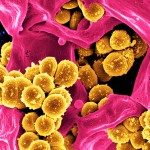Lien vers Pubmed [PMID] – 23764848
Cell Death Dis 2013;4:e667
We previously demonstrated that overexpression of RanBP9 led to enhanced Aβ generation in a variety of cell lines and primary neuronal cultures, and subsequently, we confirmed increased amyloid plaque burden in a mouse model of Alzheimer’s disease (AD). In the present study, we found striking reduction of spinophilin protein levels when RanBP9 is overexpressed. At 12 months of age, we found spinophilin levels reduced by 70% (P<0.001) in the cortex of APΔE9/RanBP9 mice compared with that in wild-type (WT) controls. In the hippocampus, the spinophilin levels were reduced by 45% (P<0.01) in the APΔE9/RanBP9 mice. Spinophilin immunoreactivity was also reduced by 22% (P<0.01) and 12% (P<0.05) in the cortex of APΔE9/RanBP9 and APΔE9 mice, respectively. In the hippocampus, the reductions were 27% (P<0.001) and 14% (P<0.001) in the APΔE9/RanBP9 and APΔE9 mice, respectively. However, in the cerebellum, spinophilin levels were not altered in either APΔE9 or APΔE9/RanBP9 mice. Additionally, synaptosomal functional integrity was reduced under basal conditions by 39% (P<0.001) in the APΔE9/RanBP9 mice and ~23% (P<0.001) in the APΔE9 mice compared with that in WT controls. Under ATP- and KCl-stimulated conditions, we observed higher mitochondrial activity in the WT and APΔE9 mice, but lower in the APΔE9/RanBP9 mice. Significantly, we confirmed the inverse relationship between RanBP9-N60 and spinophilin in the synaptosomes of Alzheimer's brains. More importantly, both APΔE9 and APΔE9/RanBP9 mice showed impaired learning and memory skills compared to WT controls. These data suggest that RanBP9 might play a crucial role in the loss of spines and synapses in AD.
